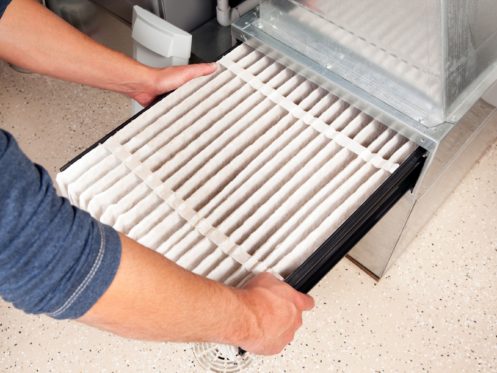Furnace filters come in different materials, including fiberglass, cotton, and polyester. A standard filtration media can capture dirt, dust, and pet dander, but you can choose other efficient options based on your indoor air quality requirements. The ideal filter will depend on pollution levels in your indoor air. Here is a look at how to choose the best filter for your home.
Filter Rating and Classification Systems
A filter is essential for keeping your furnace efficient and reliable. Dust and debris can accumulate in your heating system, causing overheating. Grime can also deteriorate components like the condenser and evaporator coils.
Standard air filters are the most commonly available filtration solution for your furnace. They can capture large particles, including pet dander, carpet fibers, pollen, and dust. These filters have a MERV rating of between 1 and 7.
MERV (minimum efficiency reporting value) is a rating ranging from 1 to 20 that determines the filter’s efficiency. The higher the value, the more particles it can capture.
The MERV rating was developed by ASHRAE (American Society of Heating, Refrigeration and Air-conditioning Engineers). However, other companies like Home Depot and Filtrete have their own rating systems.
Both companies provide charts to compare the efficacy of their filters to MERV. It is advisable to pay attention to the different rating systems when shopping for a filter.
A Thick or Thin Filter?
A value of 8 to 13 MERV is considered a mid-efficiency filter capable of removing up to 90% of the pollutants. Such mid-efficiency systems tend to have a thicker filter. A standard filter will have a width of 1 inch while a mid-efficiency model will typically be 3 or 4 inches.
More thickness means that the filter has room to capture more pollutants. A 4-inch filter is ideal for homes with occupants who are allergic to microbes or mold spores.
Besides enhancing your indoor air quality, a thicker filter also lasts longer. For example, a 1-inch filter may require replacing or cleaning every month, but a wider 4-inch one can last up to six months, depending on the indoor air quality in your home.
So, should you go for the thicker filter? It depends on the specifications of your furnace. Not all systems are designed for mid-range efficiency filters. If you replace a standard filter with a thicker 4-inch filter, it can cause airflow obstructions, leading to furnace overheating.
Additionally, if you place a 4-inch filter in a 1-inch slot, you could worsen indoor pollution. The compartment is too shallow to permit a proper fit. Therefore, it allows unfiltered air to get into the building through the air ducts.
The filter you choose for your system should match your furnace specifications. If you want to upgrade to a higher rating, you can consult our highly qualified air quality team. At Summit Heating & AC, we can protect your furnace and enhance your home’s indoor air quality in Denver.
Fiberglass Versus Pleated Air Filters
Fiberglass is the best air filter when you’re looking for an inexpensive option to capture larger particles. As long as the filter is new, there is little chance that it will impede airflow.
The disadvantage with the fiberglass mesh is that they require replacement every month. Once the filter accumulates debris and dust, it can introduce contaminants into the room.
Unlike the fiberglass mesh, pleated fibers provide a larger surface area for capturing contaminants. Its multiple folds offer a greater capacity for filtration without increasing thickness. It can last longer and does not increase your energy consumption due to airflow blockages.
One disadvantage of pleated fibers is that they cost more than fiberglass filters. However, they are more reliable and require little maintenance. They also do not encourage the spread of microbes that trigger allergies.
Humidity, Microbes, and Air Filtration
High levels of relative humidity can increase the number of microbes and pollutants in your home. When relative humidity is above 60% in Denver, symptoms for people with respiratory conditions may worsen.
Another issue with high relative humidity is that it can quickly damage the filter. For example, standard filters have board frames made of cardboard. Moisture can damage the structure and compromise its ability to capture pollutants.
Filters with pleated fibers are the best for humid environments. Furthermore, pleated filters above MERV 8 can capture mold spores, bacteria, and viruses. Therefore, they are the best for protecting your home from microbes.
If you are looking for a filter for humid environments, consider options with industrial-grade baseboards. You may also need a dehumidifier to get rid of moisture effectively. At Summit Heating & AC, we can provide air cleaners, filtration systems, and dehumidifiers for your Denver home.
Furnace Filter and Maintenance Considerations
Manufacturers offer two types of filters: disposable and reusable. Disposable filters require replacements monthly. Therefore, they are more expensive to maintain.
Reusable filters cost less over the long term, but they require cleaning routinely to keep them efficient at eliminating pollutants. They can be labor-intensive to maintain since all the debris on the mesh has to be flushed out.
Washable filters must be completely dry before they are re-installed in the system. Dampness can encourage mold and microbes to thrive.
If you want to reduce the maintenance work, you could opt for a disposable filter. Disposables tend to have higher MERV ratings than their reusable counterparts. The reusable filter is ideal for homes with moderate air quality concerns and budgetary constraints.
Choosing a Filter to Remove Odors
Your standard furnace filter can only capture large particles. A specialized filter with a higher MERV, on the other hand, may reduce the particles that cause a foul smell in your home.
These furnace filters are also known as deodorizing filters. They are suitable for homeowners who want to rid their homes of odors from pets or cooking activities.
The primary element of a furnace filter that can reduce unpleasant odors is activated carbon. Activated carbon has an internal surface area that can neutralize smelly gases. The activated carbon has millions of pores that stop most of the odor-causing particles. Deodorizing filters may also include pleated fibers or additional odor-reducing agents like baking soda.
It is also worth noting that installation is crucial for the efficacy of carbon-activated filters. Incorrect orientation of the mesh will make it less effective.
You also need to identify the odor-causing particles you’re trying to eliminate. According to the EPA, no one filter can eliminate all the contaminants in a building. Analyzing your home’s indoor air quality is essential for finding the right solution.
The EPA also advises homeowners to address indoor air quality concerns through other means besides using a filter. You can boost ventilation to rid your home of harmful contaminants.
Also, consider a whole-house air filtration system that captures pollutants from all corners of the building. A whole-house system is ideal in homes with multiple occupants. A suitable filter can eliminate all the odors from painting, cooking, and cleaning.
Summit Heating & AC is a leading indoor air quality service provider in the Denver Metro Area. As a locally owned service company, we offer heating and cooling services, as well as water heater repair and other plumbing services. Summit Heating & AC offers air filters, air cleaners, and purification systems with fair and honest pricing. Call our NATE-certified technicians today for an exceptional customer experience with a 100% guarantee on all our services.


